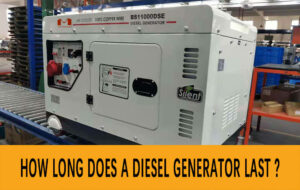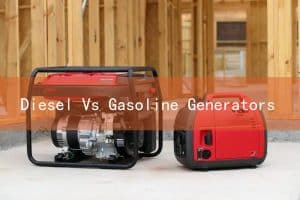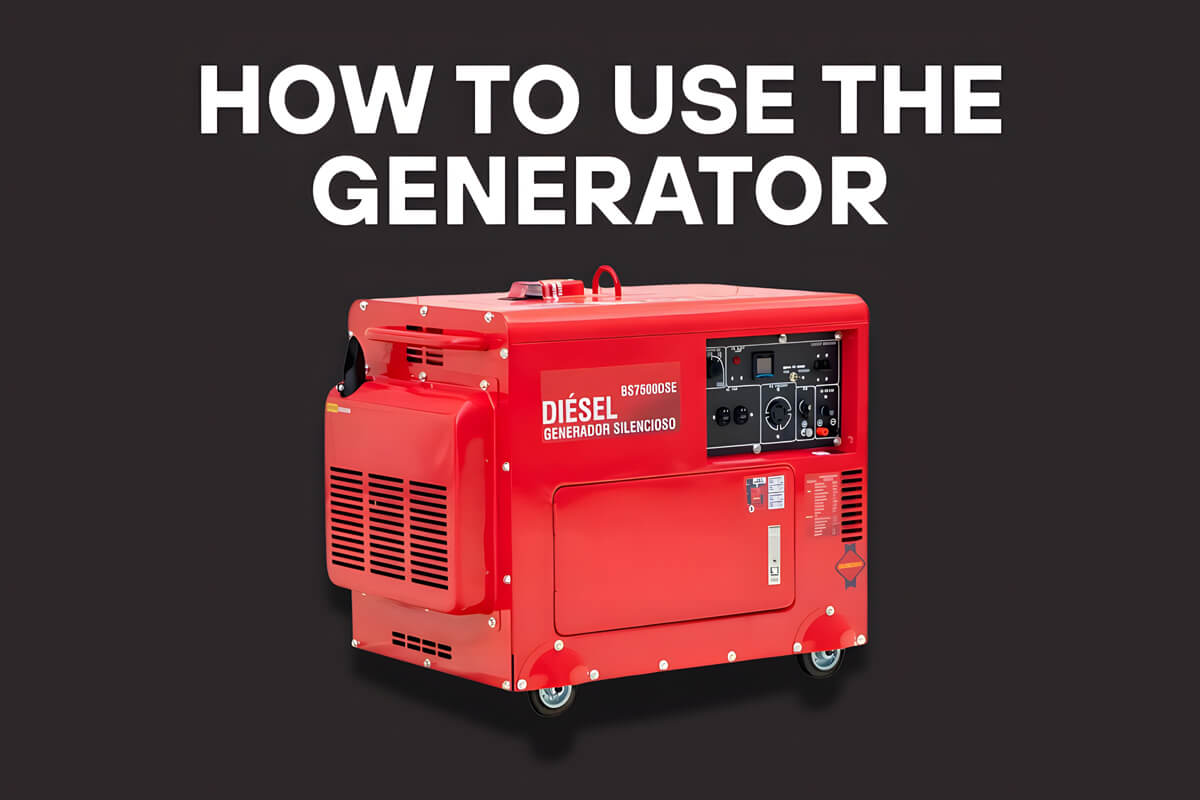how to improve diesel generator efficiency?
Diesel generators are a reliable power source that converts diesel into electricity and are widely used in industrial, commercial, and residential environments as backup power or primary energy solutions for off-grid areas.
However, with the rising cost of diesel and the growing awareness of energy efficiency, improving the performance of diesel generators has become more important than ever.
To get the best fuel consumption rate and generator maintenance investment, you need to run your generator at peak efficiency. This not only reduces fuel costs, but also minimizes environmental impact, extends equipment life, and improves overall performance.
Do you want to improve the efficiency of your diesel generator? In this article, MATCHUP will take a closer look at the factors that affect diesel generator fuel efficiency and then explore practical and effective ways to improve diesel generator efficiency.

generator efficiency basics
Diesel generator efficiency refers to how effectively the generator converts the energy in the diesel fuel into usable electrical energy. In simple terms, it is the ratio of the generator’s energy output (electricity) to its energy input (diesel fuel consumed). For example, if a generator converts 40% of the fuel’s energy into electricity, it is 40% efficient. But in reality, no electric motor is 100% efficient. The remaining energy is lost in the form of heat, vibration, and other inefficiencies during the power generation process.
Diesel generator fuel efficiency tips
Generator efficiency can be improved by using high-quality fuel, minimizing the time it is in use, and managing the load for maximum output. Regular maintenance and proper operating settings can also improve performance.
Use the right fuel
By prioritizing fuel quality, adopting proper storage methods, and utilizing additives or fuel treatments for fuel, you can significantly improve engine efficiency and reduce wear.
Ensure quality fuel
Using the right diesel for your generator is critical. Clean, high-quality diesel burns cleaner and more efficiently, provides better energy output, and minimizes deposits in fuel injectors and combustion chambers. Using inferior fuel (contaminated fuel, which may have impurities or deposits) or fuel not recommended by the manufacturer (low grade) can negatively affect its performance, such as filter plugging, carbon deposits, and erratic engine performance
Proper fuel storage methods
You may have purchased high-quality fuel, but how long ago did you buy it? Fuel ages and degrades due to long periods of disuse, affecting the efficiency and life of your generator.
Accumulation of water, dirt, and microorganisms such as algae can contaminate the fuel, and proper fuel storage methods, such as keeping the tank clean, sealed, and moisture-proof, are essential to ensure fuel quality.
Fuel additives and treatment systems
Fuel additives and treatment systems can further improve generator performance and fuel life.
- Additives are designed to: 1. Improve fuel stability and prevent degradation. 2. Clean fuel injectors and combustion components. Minimize water contamination by breaking water molecules into smaller particles for easier removal. 3. Prevent the growth of microbial contaminants.
- Fuel treatment systems, such as fuel polishing units, remove water, debris, and contaminants from stored fuel, ensuring only clean, high-quality fuel is supplied to the engine.
Generator use
It is important to note that the more often you use your generator, the higher the fuel consumption. So, consider when you need the power, and when you can save it?
For example, while hospitals and airports need generators running 24/7, corporate entities may only need power during customer-facing hours. In this case, a timer control will be used to control the engine’s operating hours. You can choose to shut off the power outside of these hours, thereby extending the life of the diesel generator’s fuel supply.
However, it is important to note that never running the generator can also cause problems. Your generator will accumulate harmful dirt and debris from lack of use, which will reduce efficiency and slow down. The solution is to connect the generator to the load bank regularly. This helps ensure that the generator can operate reliably in an emergency.
Optimizing load management
The electrical load on the generator set also affects fuel consumption. Diesel generators work best when they are operated within their optimal load capacity range, typically between 50-80% of rated load.
The problem with underloading and overloading
Underloading
Operating a diesel generator at very low loads (less than 30% of its capacity) is often referred to as “wet buildup.” During underloading, the engine burns fuel inefficiently, causing unburned fuel and carbon deposits to build up in the engine and exhaust system. Over time, this leads to increased wear, reduced efficiency, and increased maintenance costs.
Overloading
Overloading, on the other hand, occurs when the demand for power exceeds the rated capacity of the generator. Operating under this condition generates excessive heat, stresses the engine and components, and can cause overheating or permanent damage. Additionally, overloading increases fuel consumption and reduces the overall efficiency of the generator.
Better load management strategies
- Choose a generator with the right capacity for your power requirements: Before purchasing or installing a generator, carefully evaluate your typical and peak power needs to avoid oversizing or under sizing the equipment. For facilities with fluctuating power demand, using multiple small generators instead of one large generator can be a more flexible and efficient option.
- Balance loads across phases: This unbalanced load reduces efficiency and stresses the system. Ensuring that loads are evenly distributed helps generators run smoothly and minimizes energy losses.
- Prevent “wet pileups”: Creating artificial loads helps avoid this problem and promotes healthy engine combustion.
- Implement load shedding: During peak demand, consider using load shedding strategies to temporarily disconnect non-essential equipment. This ensures that the generator is not overloaded while maintaining power for the most critical systems.
- Periodic load testing: Operators can apply controlled artificial loads to generators by connecting them to load banks to uncover hidden problems, such as voltage inconsistencies, cooling issues, or faulty components, and proactively fix them.
Correct settings
Proper settings or adjustments in the system are essential for efficient operation of the generator.
- Adjusting the valves: The valves need to be adjusted precisely to ensure proper air and fuel flow in the engine. Also, check the fuel injectors regularly and replace any faulty fuel injectors.
- Generator speed: If the speed is too high or too low, it will reduce the efficiency of the generator and increase fuel consumption.
- Fuel control: The fuel control device regulates the amount of fuel entering the engine through the fuel valve. Therefore, it is important to ensure that the fuel supply valve is always set correctly.
- Temperature control: The temperature control device is used to control the temperature of the engine. The engine temperature is related to the amount of fuel entering the engine through the fuel valve. The temperature control device can help improve the efficiency of the generator and reduce fuel consumption.
Using advanced technology
Incorporating advanced technology into diesel generators is one of the most effective ways to improve their efficiency and performance.
Alternators
The performance of an alternator affects the overall performance of a generator set. A more efficient alternator means less fuel is required to produce the same amount of power. MATCHUP manufactures and designs quality alternators for generators.
Fuel management systems
Fuel management systems use automation technology to monitor and control fuel usage in real time, which helps identify inefficiencies and adjust fuel flow to accurately meet power needs.
Digital control systems
Digital control systems improve the efficiency of diesel generators by optimizing load and power management. These systems ensure that the generator operates within the most efficient load range, avoiding problems such as under- or over-loading that can waste fuel and shorten the life of the generator.
Hybrid generators
Hybrid generators combine diesel generators with multiple other energy sources to increase efficiency and reduce reliance on fuel.
Conclusion
Improving diesel generator efficiency requires a multi-pronged approach that combines technology development, regular maintenance, and operational optimization. By implementing these practices, businesses can benefit from lower operating costs, longer generator life, and a smaller environmental footprint.
You can also implement strategies such as upgrading to more fuel-efficient generators, using advanced control systems for better load management, and integrating renewable energy.
At BISON, we are committed to providing high-performance diesel generators designed for maximum efficiency and durability. Our products combine advanced technology, robust engineering, and reliable performance to meet a variety of power needs. By choosing our generators, you can optimize operations, reduce costs, and ensure a sustainable energy solution.
Contact us today to learn more about our diesel generators and how we can help you!

May Ge
Outdoor Machinery Export Manager 6-Yr Exp 🌍 ∣ BSCI, EPA, EURO V, CE ∣ Generator, High-pressure Washer, Water Pump, Engine, Floor Scrubber ∣ 🚀 24/7 Second Reply
TAIZHOU BISON MACHINERY CO.,LTD | Ningbo University of Technology
Our related blog

how long does a diesel generator last
MATCHUP will explore key factors that affect lifespan of a diesel generator, including frequency of use, generator size, maintenance practices, environmental conditions and more.

diesel vs gasoline generators: which is better?
MATCHUP shares the differences between diesel generators and gasoline generators so that customers can easily choose the generator that suits their needs.








